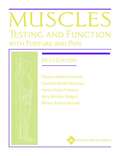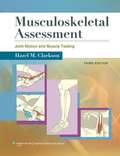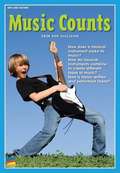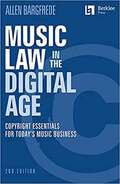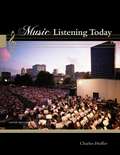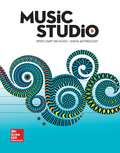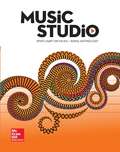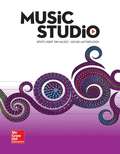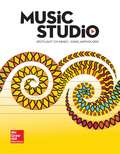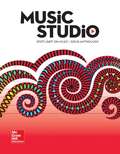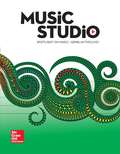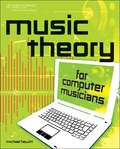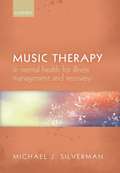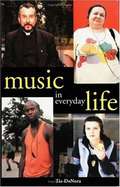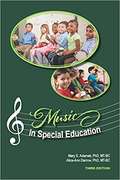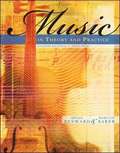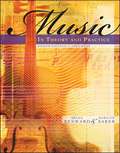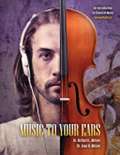- Table View
- List View
Muscles Testing and Function with Posture and Pain (5th Edition)
by Florence Peterson Kendall Elizabeth Kendall Mccreary Patricia Geise Provance Mary Mcintyre Rodgers William Anthony RomaniThis book intends to provide rehabilitation professionals with a wealth of knowledge and background in the all-important aspect of the patient/client examination process.
Muscles That Never Quit (Fountas & Pinnell Classroom, Guided Reading Grade 3)
by Arlene BlockNIMAC-sourced textbook
Musculoskeletal Assessment: Joint Motion and Muscle Testing (Third Edition)
by Hazel M. ClarksonA comprehensive textbook that contains the principles and methodology of joint Range of Motion (ROM) and manual muscle strength evaluation in one volume.
Museum Adventures (Into Reading, Level N #14)
by Gabriel Berman Ronald LipkingNIMAC-sourced textbook
Music Comes in All Sizes (Into Reading, Benchmark 3-6, Level M #4)
by Alan Fraser Beata SzpuraNIMAC-sourced textbook
Music Counts
by Pam Hirschfeld Erin Ash SullivanFind out about various aspects of music, the people who make music, and the different types of musical instruments.
Music Law in the Digital Age: Learn Copyright Essentials in Order to Succeed in Today's Music Industry
by Allen BargfredeWith the free-form exchange of music files and musical ideas online, understanding copyright laws has become essential to career success in the new music marketplace. This cutting-edge, plain-language guide shows you how copyright law drives the contemporary music industry. By looking at the law and its recent history, you will understand the new issues introduced by the digital age, as well as continuing issues of traditional copyright law. <p><p> Whether you are an artist, lawyer, entertainment Web site administrator, record label executive, student, or other participant in the music industry, this book will help you understand how copyright law affects you, helping you use the law to your benefit.
Music Listening Today
by Charles HofferCharles Hoffer's best-selling MUSIC LISTENING TODAY is a complete course solution that develops student's listening skills while teaching them to appreciate the different styles, forms, and genres of music. The text provides dozens of familiar and lesser-known musical selections, all carefully chosen for their ability to get students interested in listening to all kinds of music.
Music Mind and Education
by Keith SwanwickExplores the psychological and sociological dimensions of musical experience and their implications for music teachers. this significant book should be in the hands of all with an interest in music education' - "TES" This title available in eBook format. Click here for more information. Visit our ebookstore at: www. ebookstore. tandf. co. uk.
Music Studio: Spotlight On Music [Grade 2], Song Anthology (General Music Ser.)
by Judy Bond Margaret Campbelle-Holman René BoyerNIMAC-sourced textbook
Music Studio: Spotlight On Music [Grade 3], Song Anthology (General Music Ser.)
by Judy Bond Margaret Campbelle-Holman René BoyerNIMAC-sourced textbook
Music Studio: Spotlight On Music [Grade 5], Song Anthology (General Music Ser.)
by Judy Bond Margaret Campbelle-Holman René BoyerNIMAC-sourced textbook
Music Studio: Spotlight On Music [Grade K], Song Anthology (General Music Ser.)
by Judy Bond Margaret Campbelle-Holman René BoyerNIMAC-sourced textbook
Music Studio: Spotlight on Music [Grade 1], Song Anthology (General Music Ser.)
by Judy Bond Margaret Campbelle-Holman René BoyerNIMAC-sourced textbook
Music Studio: Spotlight on Music [Grade 4], Song Anthology (General Music Ser.)
by Judy Bond Margaret Campbelle-Holman René BoyerNIMAC-sourced textbook
Music Theory For Computer Musicians
by Michael HewittMany DJs, gigging musicians, and electronic music producers understand how to play their instruments or make music on the computer, but they lack the basic knowledge of music theory needed to take their music-making to the next level and compose truly professional tracks. Beneath all the enormously different styles of modern electronic music lie certain fundamentals of the musical language that are exactly the same no matter what kind of music you write. It is very important to acquire an understanding of these fundamentals if you are to develop as a musician and music producer. Put simply, you need to know what you are doing with regard to the music that you are writing. Music Theory for Computer Musicians explains these music theory fundamentals in the most simple and accessible way possible. Concepts are taught using the MIDI keyboard environment and today's computer composing and recording software. By reading this book and following the exercises contained within it, you, the aspiring music producer/computer musician, will find yourself making great progress toward understanding and using these fundamentals of the music language. The result will be a great improvement in your ability to write and produce your own original music!
Music Therapy in Mental Health for Illness Management and Recovery
by Michael J. SilvermanMany music therapists work in adult mental health settings after qualifying. For many, it will be a challenging and even daunting prospect. Yet until now, there has been no psychiatric music therapy text providing advice on illness management and recovery. <p><p> This essential book fills the gap in the literature, providing the necessary breadth and depth to inform readers of the psychotherapeutic research base and show how music therapy can effectively and efficiently function within a clinical scenario. The book takes an illness management and recovery approach to music therapy specific to contemporary group-based practice. It is also valuable for administrators of music therapy, providing innovative theory-based approaches to psychiatric music therapy, developing and describing new ways to conceptualize psychiatric music therapy treatment, educating music therapists, stimulating research and employment, and influencing legislative policies. <p> An important aim of the book is to stimulate both critical thought and lifelong learning concerning issues, ideas, and concepts related to mental illness and music therapy. Critical thinking and lifelong learning have been - and will likely continue to be - essential aspirations in higher education. Moreover, contemporary views concerning evidence-based practice rely heavily upon the clinician's ability to think critically, seek a breadth of contradicting and confirmatory evidence, implement meta-cognition to monitor thoughts throughout processes, and synthesize and evaluate knowledge to make informed clinical decisions relevant and applicable to idiosyncratic contextual parameters. <p> For both students and clinicians in music therapy, this is an indispensable text to help them learn, develop, and hone their skills in music therapy
Music from a Landfill (Fountas & Pinnell Classroom, Guided Reading Grade 3)
by Laura JohnsonNIMAC-sourced textbook
Music in Everyday Life
by Tia DenoraThe power of music to influence mood, create scenes, routines and occasions is widely recognised and this is reflected in a strand of social theory from Plato to Adorno that portrays music as an influence on character, social structure and action. There have, however, been few attempts to specify this power empirically and to provide theoretically grounded accounts of music's structuring properties in everyday experience. Music in Everyday Life uses a series of ethnographic studies - an aerobics class, karaoke evenings, music therapy sessions and the use of background music in the retail sector - as well as in-depth interviews to show how music is a constitutive feature of human agency. Drawing together concepts from psychology, sociology and socio-linguistics it develops a theory of music's active role in the construction of personal and social life and highlights the aesthetic dimension of social order and organisation in late modern societies.
Music in Special Education
by Mary Adamek Alice-Ann DarrowThe field of special education has changed greatly over the past four decades. With many of the changes, the responsibilities of music educators and music therapists have also changed. Music professionals in schools must keep abreast of related laws, terminologies, special education initiatives, and current instructional approaches, materials, and technologies in order to meet the needs of students with disabilities. Inclusive education has contributed to the changed roles of music therapists and music educators in the classroom. Music in Special Education (third edition) provides an introduction to the field of special education, and the current roles of music education and music therapy in the lives of students with disabilities and their families. <p><p> This updated edition of Music in Special Education explains important concepts in special education that are important for interdisciplinary communication and effective teamwork. Part I introduces the reader to the historical and instructional foundations of music in special education including major topics and developments in the field of special education, important terminology, and curricular issues. Part II introduces the characteristics of specific disabilities, the educational implications of these disabilities, appropriate instructional adaptations, as well as music education and music therapy approaches used with students who have these disabilities. Part III addresses the roles music educators and music therapists play in family and community lives of students with disabilities. <p> Music in Special Education (third edition) is an essential text to prepare effective future music educators and music therapists working in special education.
Music in Theory and Practice, Volume 1 (8th edition)
by Bruce Benward Marilyn SakerThis best-selling text gives majors a solid foundation in the theory of music - generally and throughout history. It strengthens their musical intuition, builds technical skills, and helps them gain interpretive insights. The two-volume format ensures exhaustive coverage and maximum support for students and faculty alike. Volume I serves as a general introduction to music theory while volume II offers a survey of the theoretical underpinnings of musical styles and forms from Gregorian Chant through the present day.
Music in Theory and Practice, Volume 2 (8th edition)
by Bruce Benward Marilyn SakerThis best-selling text gives majors a solid foundation in the theory of music - generally and throughout history. It strengthens their musical intuition, builds technical skills, and helps them gain interpretive insights. The two-volume format ensures exhaustive coverage and maximum support for students and faculty alike. Volume I serves as a general introduction to music theory while volume II offers a survey of the theoretical underpinnings of musical styles and forms from Gregorian Chant through the present day.
Music to Your Ears: An Introduction to Classical Music
by Richard L Mcgee Joan B McgeeMusic to Your Ears: An Introduction to Classical Music
